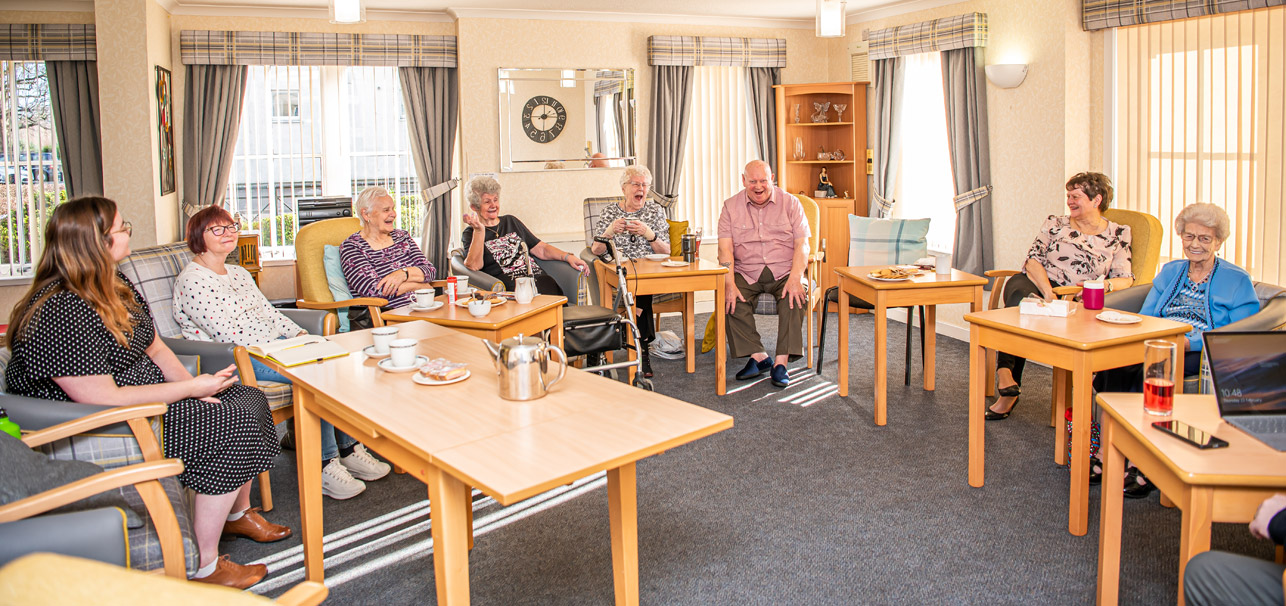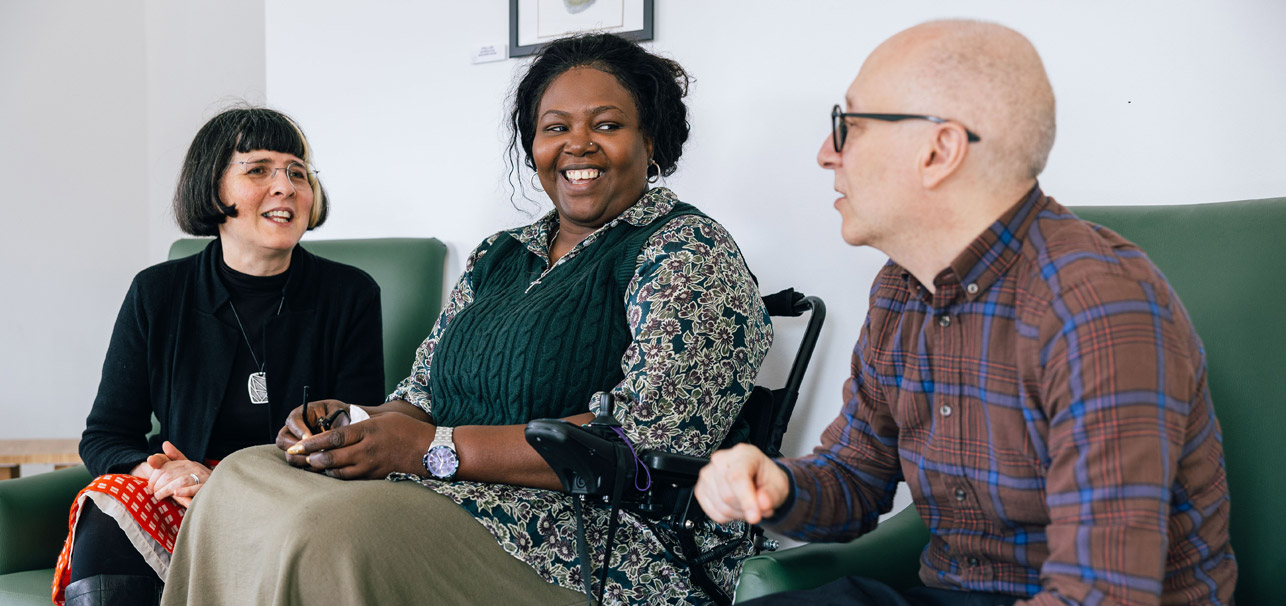What is co-production?
Everyone is talking about co-production but exactly what is it?
Co-production has become the default term for describing activities that involve citizens working with professionals to improve public services.
Co-production builds on and is related to consultation, citizen participation, public engagement, service user involvement and self-advocacy.
Policy and practice
Since the Community Care Act 1990 (opens new window)successive governments of all parties have recognised the importance that citizen involvement in services can play in delivering better outcomes. Almost all legislation and policy on social issues recognises the important of citizen participation. The 2014 Care Act (opens new window)used the term co-production to describe this activity. More recently ‘People at the Heart of Care (opens new window)’the 2021 Adult Social Care Reform White paper makes the commitment to:
…set up co-productive forums to ensure that the voices of those who draw upon care and support are involved in the ongoing design and implementation of social care reform.
Definitions and principles of co-production
Introduction
Everybody involved in co-production needs to have a shared understanding of co-production. So, it’s important that organisations developing co-production develop have a clear definition of co-production. In some ways it is easier to understand co-production as a set of principles. So, it is also recommended that organisations develop a set of principles alongside the definition. This section describes the TAPPI definitions of co-production and set of principles which the programme used.
Background
A three-nation approach
TAPPI worked across England, Scotland, and Wales. It is important that how we talk about co-production is sensitive to national considerations. Especially as co-production in the three nations is coordinated and promoted by different agencies. So, it makes sense for organisations to use the language that is already in common usage nationally. However, it is important to point out that there are no fundamental differences in co-production policy and practice in England, Scotland, and Wales.
Not reinventing the wheel
There is an enormous amount of information and guidance available on co-production. Including many different models, definitions and sets of principles. All of them emphasise similar ideas around equality, partnership and sharing power.
However, this blizzard of guidance and information can be confusing and off putting. It is therefore important that as far as possible organisations do not add to an already overwhelming landscape. Therefore, it is recommended that organisations adopt the most authoritative already existing definition of Co-production and sets of principles in each nation.
Scotland
The Scottish co-production network is funded by the Scottish government and hosted by the Scottish Community Development Centre. The network co-ordinates Scottish Co-production week every year in November.

The network describes Co-production as follows:
“Co-production is about combining everyone’s strengths so that we can work together to achieve positive change. Too often public services are designed by people who don’t have direct experience of what it’s like to need or use them. Ultimately, decisions are made for people, not with them.
Using co-production, we can do things differently. This means communities truly playing a part in how decisions are made - where things happen with people, instead of to them. We know that people are sometimes involved in decisions about how services are delivered. But by using a co-productive approach, we can go further so that professionals and decisions makers work with people and communities, not just to influence how decisions are made, but to have a say in what’s needed, how it’s developed and how it can be delivered.
Co-production goes beyond participation and partnership working because it requires people to act together on an equal basis. It means we can all contribute our lived experience, skills, and ideas about what works, to make our communities even better.
Done well, this can shift the balance of power – so that everyone feels they have worked together on decisions that make a real difference to people’s lives, reshaping how communities view their relationships with services.”
Scottish co-production network (opens new window)
It is suggested that in Scotland the SCIE principles of co-production (described below) may also be a helpful tool.
Wales
 The Co-production Network for Wales is an independent organisation funded by the Welsh Government, National Lottery Community Fund and provides consultancy and training services.
The Co-production Network for Wales is an independent organisation funded by the Welsh Government, National Lottery Community Fund and provides consultancy and training services.
The Network defines co-production as follows:
‘Co-production is an asset-based approach to public services that enables people providing and people receiving services to share power and responsibility, and to work together in equal, reciprocal and caring relationships. It creates opportunities for people to access support when they need it, and to contribute to social change.
It is a mindset and a way of working, based on these 5 values:
- Value people and build on their strengths
- Develop networks that operate across silos
- Focus on what matters for the people involved
- Build relationships of trust & shared power
- Enable people to be change makers’
England
For England the suggested materials consist of NHS England/The Coalition for Personalised Care (opens new window) definition plus the Social Care Institute for Excellence (opens new window) (SCIE) co-production principles. These materials combined represent the most authoritative and evidence-based guidance on co-production currently available in England.
NHS England’s definition
“Co-production is a way of working that involves people who use housing, health and care services, carers and communities in equal partnership; and which engages groups of people from the earliest stages of service design, development and evaluation.”
NHS England (opens new window)

Principles of co-production
As well as defining co-production it is useful to think of it as a set of principles or values. These four values of equality, diversity, accessibility and reciprocity were co-produced by SCIE (opens new window):
Equality – everyone has assets
Co-production starts from the idea that no one group, or person is more important than any other group or person. So, everyone is equal, and everyone has assets to bring to the process. Assets refer to skills, abilities, time, and other qualities that people have. This is different from approaches that focus on people’s problems and what they cannot do. Equality can only be achieved with a shift in power towards people who draw on care and support and carers.
Diversity
It follows from the previous principle that diversity and inclusion are important values in co-production. This can be challenging but it is important that co-production projects are pro-active about diversity. It has been found in work on the involvement and participation of people who use services that some groups are under-represented or excluded from such work, and this is likely to apply equally to co-production. People who use services can be excluded because of equalities issues or because of the nature of their impairment.
Accessibility
Access needs to be recognised as a fundamental principle of co-production. The process of co-production needs to be accessible if everyone is going to take part on an equal basis. Accessibility is about ensuring that everyone has the same opportunity to take part in an activity fully, in the way that suits them best. As well as physical access, ensuring that information is accessible and that it is provided in appropriate formats and languages is a key part of making sure that everyone can take part in co-production.
If you put something in, you get something out
‘Reciprocity’ or mutual benefit is a key concept in co-production. It has been defined as ensuring that people receive something back for putting something in and building on people’s desire to feel needed and valued. The idea has been linked to ‘mutuality’ and all parties involved having responsibilities and expectations.
Talking to different audiences about co-production
To engage different audiences, it may be necessary to describe co-production in more accessible language and possibly other formats such as easy read. The definitions and principles use relatively formal language that some people may find inaccessible.
It is suggested that the following phrases might be helpful to explain co-production in plain English.
- ‘Co-production is about tenants, and their families working in equal partnerships with staff.’
- ‘Co-production is about working and learning together’
- ‘If we work co-productively with tenants, they will find out more about their housing provider and why some things are possible, and others are not. And staff will find out more about what it is really like to live in the properties they provide. It’s about encouraging mutual understanding and building trust.’
- ‘Co-production means nothing about us without us.’
